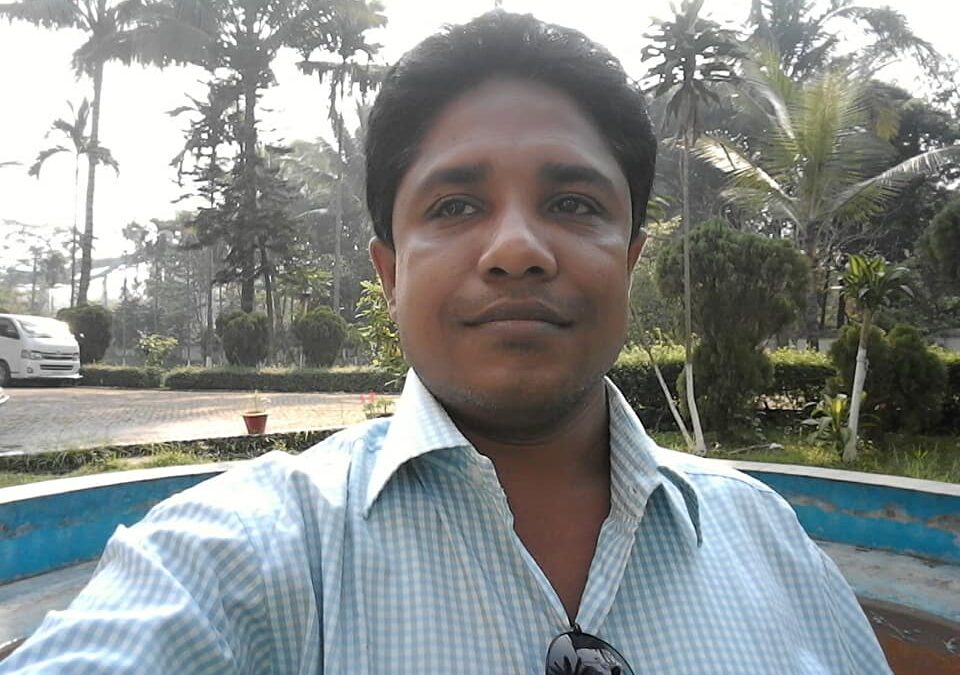
Jun 24, 2024
Marking the one-year anniversary of the murder of Bangladesh union leader Shahidul Islam, the Solidarity Center is demanding that the police investigation of his case be reopened to ensure that the main perpetrators of the crime are held accountable and that the persistent harassment and unfair labor practices committed against worker leaders in the country end.
A dedicated trade union organizer and leader of the Bangladesh Garment and Industrial Workers Federation (BGIWF), Shahidul was brutally attacked outside Prince Jacquard Sweaters Ltd. factory on June 25, 2023, in retaliation for his efforts to help workers claim their hard-earned, long overdue wages and benefits. He succumbed to his injuries in a local hospital.
Just 45 years old at the time of his death, Shahidul is survived by his wife, also a former union organizer, and two school-age children. He was the sole wage earner for his family. With bills, school fees and her cancer treatments to pay for, Shahidul’s wife is struggling to get by.
While police in February submitted a charge sheet to the Gazipur court accusing 14 individuals in the murder of Shahidul Islam, including one administrative management official from Prince Jacquard Sweaters Ltd., trial dates remain to be set and the investigation is ongoing. Though it is positive to see that police have established a clear link between factory management and the crime, labor rights groups and Shahidul’s family argue that the investigation did not go far enough and that higher-level company officials were likely involved.
“Shahidul Islam knew that without organizing rights, workers cannot collectively bargain for better wages and working conditions in far-flung supply chains,” said Solidarity Center Executive Director Shawna Bader-Blau. “Today as we honor the legacy and memory of Shahidul, we stand united with trade unions and labor rights advocates everywhere in demanding justice for him and protection for the many committed organizers, workers and trade union leaders like him working to shift power dynamics and build worker power in the Bangladesh garment sector—the changes that he died fighting for.”
She added, “There is no alternative to strengthening protections for trade unionists so that they can exercise their fundamental rights without fear of retaliation or violence. And despite the many obstacles, we hope that change is coming.”
The Way Forward
Because of brave organizers like Shahidul Islam, the Solidarity Center has documented the formation of at least 134 independent garment sector trade unions since 2015.
In light of the culture of impunity for worker rights violations that led to his untimely death, the Solidarity Center calls for accountability, justice and transformation. We also call on:
- Brands sourcing from Prince Jacquard Sweaters Ltd. factory to take responsibility for their contribution to the conditions that led to Shahidul Islam’s murder by providing financial compensation to Shahidul’s family. All brands, regardless of whether they were directly or indirectly sourcing from Prince Jacquard, should recognize that their own supply chains are vulnerable to such a horrific event and should take concrete steps to monitor for and take swift action to address wage theft and any violations of freedom of association that occur.
- The government of Bangladesh to ensure that workers’ right to freedom of association is upheld, as the free exercise of this right can safeguard workers and organizers from the kind of violence that killed Shahidul Islam. Concerted action in this area will demonstrate the government’s commitment to upholding fundamental labor rights.
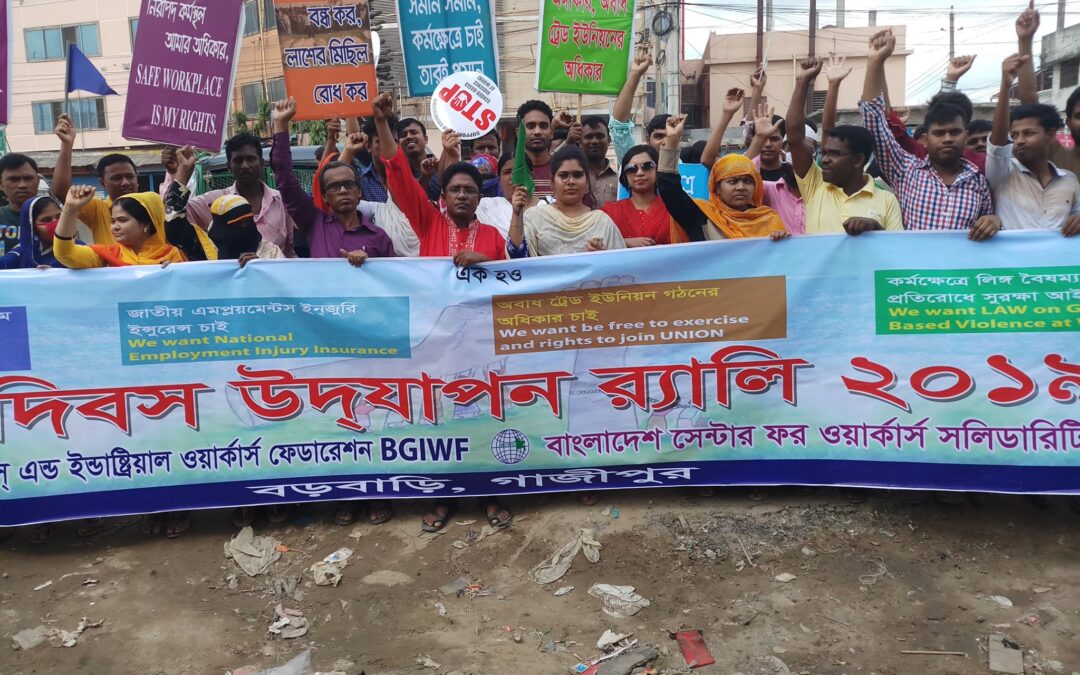
Jun 24, 2024
Over a 25-year career, Shahidul successfully mobilized thousands of workers to join trade unions and empowered them to represent their co-workers as factory-level leaders. As a young man he experienced the grueling reality of work in a garment factory. Overworked and underpaid, and despite the risk of management reprisal, Shahidul decided to take action to build a better future for himself and workers like him by joining the Bangladesh Independent Garment Workers Union Federation (BIGUF) in the late 1990s.
Shahidul learned the ropes of union organizing as a participant in the Solidarity Center’s three-year organizing internship program, enhancing his skills to build worker power. Subsequently, he joined the Bangladesh Garment and Industrial Workers Federation (BGIWF), rising to the rank of president of the Gazipur District Committee. His influence extended to Gazipur, Rampura in Dhaka, and Narayangonj District, where he facilitated the formation of numerous factory-based trade unions, empowering workers to raise their voices for better wages and working conditions. As a trained paralegal of the Solidarity Center, he championed workers in claiming wages and benefits wrongfully denied by their employers. His remarkable ability to motivate and mobilize workers, collaborate with diverse stakeholders and navigate government processes significantly impacted the Bangladesh labor movement.
How did it come to this? Lack of accountability, fear and repression
Shahidul Islam was killed outside Prince Jacquard Sweaters Ltd., a factory producing for buyers in Europe and North America, and a member of the Bangladesh Garment Manufacturers and Exporters Association (BGMEA). Prince Jacquard did not yet have a trade union, though Shahidul’s federation, BGIWF, had started supporting workers to organize not long before his death.
The global garment supply chain is notorious for its exploitation, sourcing from low-wage, minimally regulated countries where factories are rife with wage theft, union busting, forced overtime and other abuses. Multinational fashion brands outsourcing work overseas exercise economic power over suppliers—often under threat of yanking orders and moving production to more compliant factories—and make demands that lead to worker abuse but boost the brand’s bottom line. At the same time, these companies claim a hands-off relationship with suppliers in regard to workplace safety and basic worker and human rights, often hiding behind the façade of “corporate social responsibility” programs and audits. Indeed, Prince Jacquard Sweaters Ltd. had undergone outside audits by two different firms, Amfori and Sedex.
Organizing an independent, democratic union that can represent the rights of workers and help them negotiate with their employers over issues like wage and benefit payments, can be a dangerous endeavor in Bangladesh. Once organized, the trade union registration process in Bangladesh is complicated, time consuming and plagued by corruption and interference from employers and their powerful associations. Workers regularly face unfair labor practices, such as illegal terminations, threats, harassment and violence. As in the case of Shahidul Islam, it is not uncommon for employers to hire local musclemen or mercenary members of management-dominated “yellow” unions to attack workers and organizers to prevent them from exercising their right to freedom of association.
In fact, in the absence of due process for resolving collective disputes between workers and employers, efforts by workers to collectively stand up for their rights are often ignored or met with retaliation. Mere months after Shahidul’s murder, four more workers lost their lives and many more were severely injured during the 2023 workers’ protests for a fair wage. This calls into question the reports about progress on freedom of association in Bangladesh.
Meanwhile, the majority of global brands and buyers sourcing from Prince Jacquard Sweaters have remained unresponsive to repeated outreach by labor rights organizations calling on them to provide compensation to the family of Shahidul Islam, while those who did respond deny responsibility.
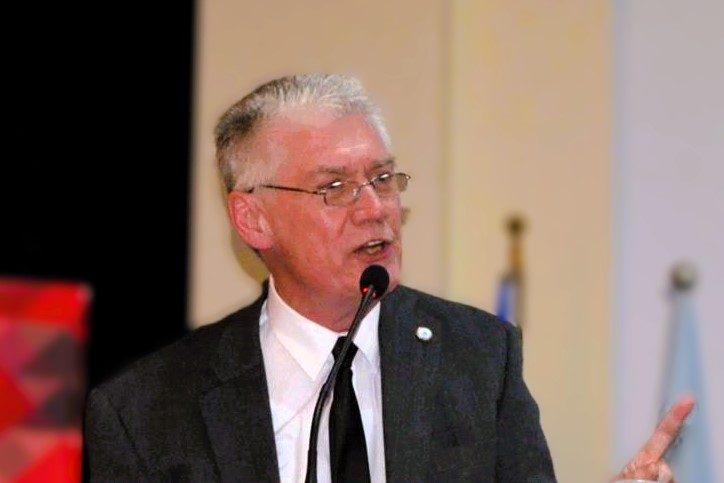
Apr 25, 2024
The global labor movement lost a friend and advocate, and the Solidarity Center a dear colleague with the passing of Laurence “Laurie” Clements on April 19 after a lengthy and courageous battle with cancer. Laurie is survived by his wife, Inja, a son, two daughters and two step-daughters.
Before Laurie’s impactful tenure at the Solidarity Center, he was a respected figure in the academic and union spheres. Starting his career at the University of Iowa Labor Center in 1984, he rose to director in 1994. Simultaneously, he served as president of the American Federation of Teachers local union and secretary-treasurer of the Iowa State Federation of Teachers. He further honed his expertise and leadership by facilitating training programs, seminars and workshops in several Balkan countries from 1996 to 2000.
Laurie joined the Solidarity Center in 2001 as country program director in Serbia. His dedication and passion for our mission took him to the Middle East and North Africa region in 2005, where he ran programs in Iraq, Kuwait and Lebanon. His leadership and invaluable contributions to our work, which we remember with deep gratitude, are a testament to his unwavering commitment.
Those fortunate enough to have attended Laurie’s training programs were witness to his unique ability to connect with participants. Our union partners, in particular, who engaged in his inspiring and thought-provoking sessions, left with a renewed sense of commitment to building union strength and solidarity.
Laurie’s fervor for organizing to advance worker rights was not just a professional pursuit but a deeply personal one. It was ignited at a young age when he witnessed the plight of workers in his neighborhood, who often suffered from work-related injuries and deaths at the docks and shipyards in his hometown of Cardiff, Wales. This early experience instilled in him a profound commitment to occupational safety and health protections.
In his recently published autobiography, “A Poem on Life,” he wrote about his childhood growing up in a government-owned “council house” with his family of five, witnessing the solidarity of the working people in his neighborhood and the power of unions to improve their lives.
“These were families who had a strong understanding of collective action,” he wrote, “and they understood the bonds of solidarity that were expressed in the industrial action of the trade union movement. The improvements in their lives had come primarily from unionization.”
Laurie Clements was a great trade unionist and a wonderful person. It was a privilege to work alongside him and call him a colleague, friend, and brother.
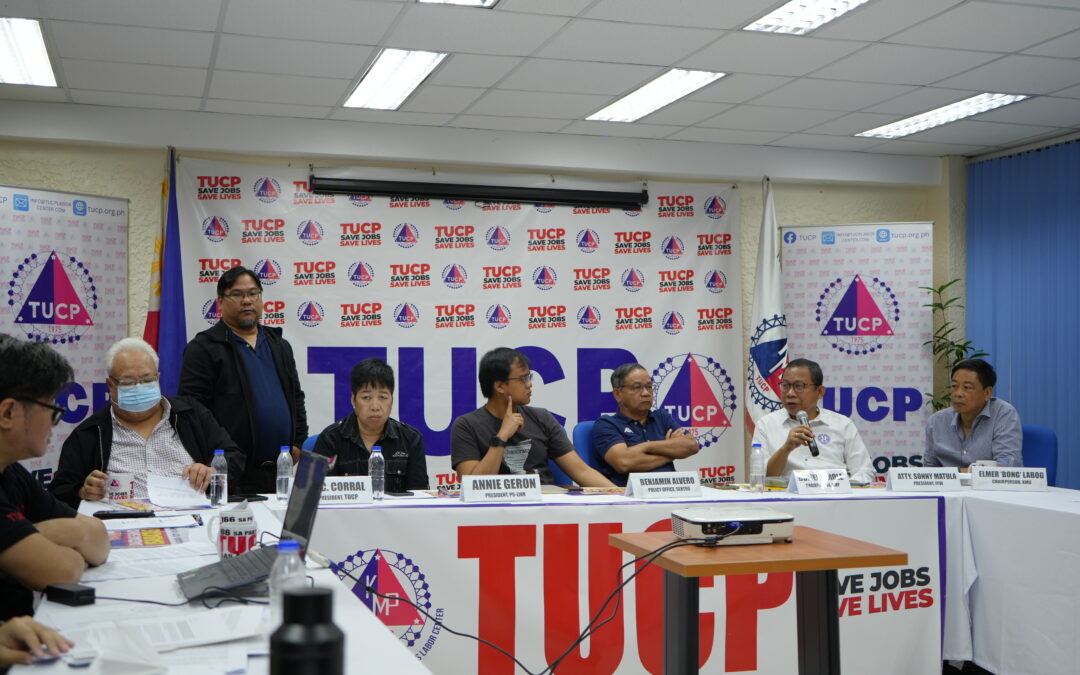
Mar 15, 2024
Philippine trade union leaders are calling for an across-the-board daily minimum wage increase in the private sector to alleviate the economic burden workers currently face.
House Bill No. 7871 calls for a wage hike of 150 PHP (approximately 3 US dollars). Amid high inflation, poor job quality and a lack of new and decent jobs, supporters argue that immediately passing and enacting the wage increase is critical to support workers’ economic recovery.
During a press conference in Quezon City on Thursday, Benjamin Alvero, chief policy officer of the Center of United and Progressive Workers (SENTRO) said, “This wage hike is not just a matter of economic development but also of justice. The wage hike that we currently have at the regional level is just to catch up with inflation, and that is not enough.”
“There is an urgency to pass this legislated wage hike as the first step in the right direction towards addressing the disparity between the family living wage standard and current minimum wage rates,” Philippine Labor representatives said in a joint statement.
Last month, the Philippine Senate approved a minimum wage increase–the first Congress-legislated wage hike since 1989—of 100 PHP (roughly 2 US dollars).
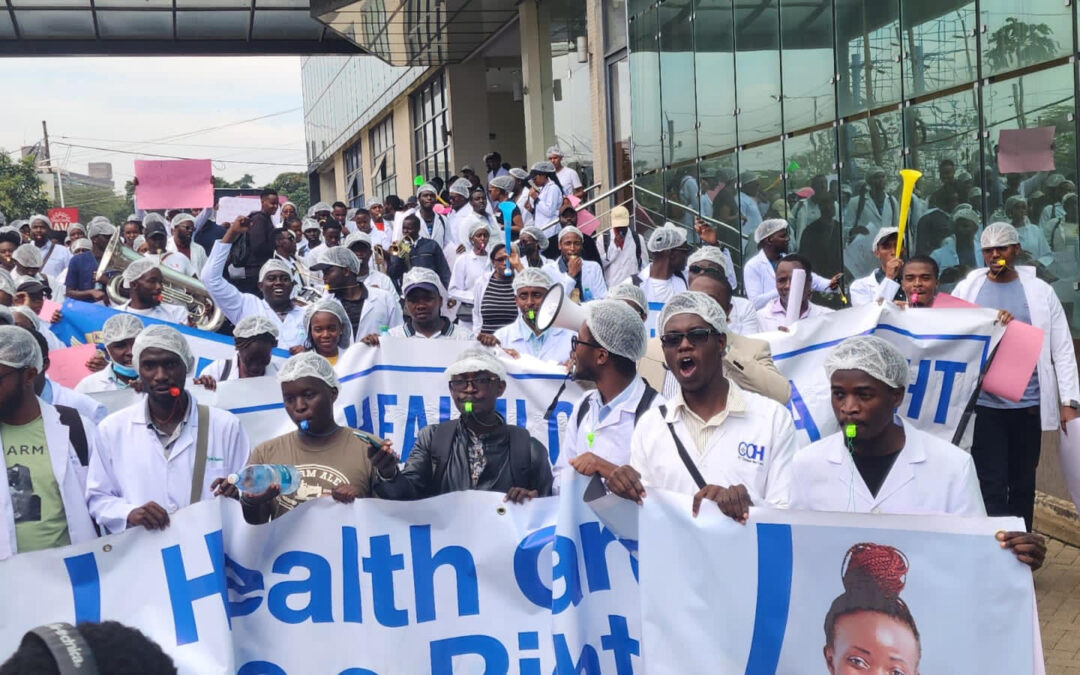
Mar 1, 2024
Yesterday, Dr. Davji Bhimji Attellah, the General Secretary of the Kenya Medical Practitioners, Pharmacists, and Dentists Union (KMPDU), was reportedly attacked by police while leading a lawful demonstration in protest of the delayed posting of over 1,000 medical interns critical to addressing the nationwide shortage of healthcare providers. Additional protesters were seriously injured when the police fired teargas canisters at the assembled protesters, causing a stampede.
Solidarity Center Executive Director Shawna Bader-Blau offered this statement:
“The Solidarity Center stands with our partners in the Kenya Medical Practitioners, Pharmacists, and Dentists Union in strongly condemning excessive and unnecessary force by police on KMPDU Secretary General Dr. Davji Attellah. We must stand firm in our defense of the rights of all workers to peacefully assemble, express their concerns, and engage in protest without fear of this kind of violence and retaliation.
This effort to intimidate and retaliate against workers and their elected leaders must be called out for what it is: a violation of fundamental human rights that are guaranteed by international law and by the Kenyan constitution. Our thoughts are with Dr. Attellah, the other injured protesters and the KMPDU and as we call for those responsible for this attack to be held accountable and brought to justice for their actions.”





